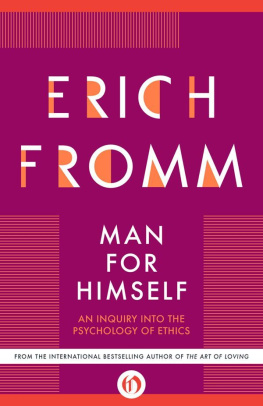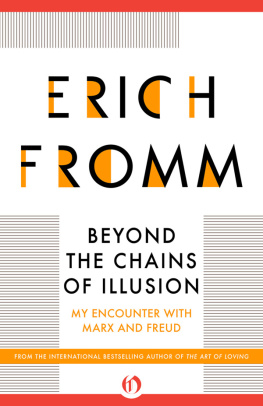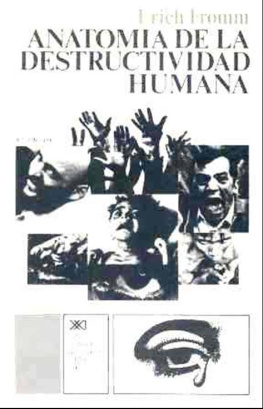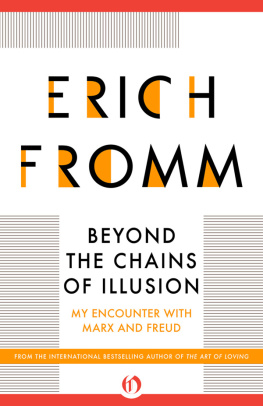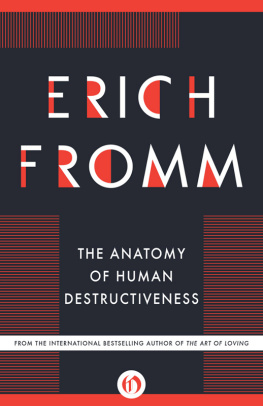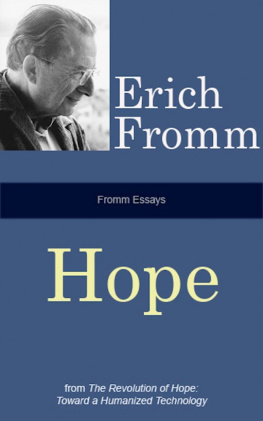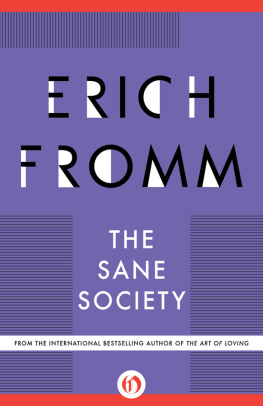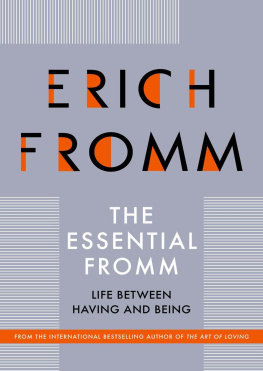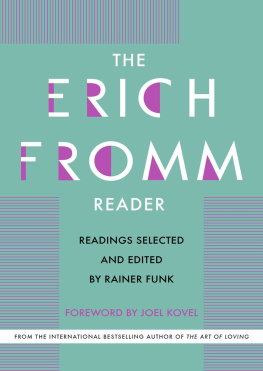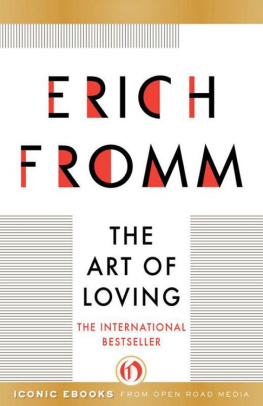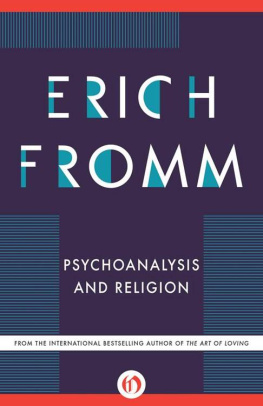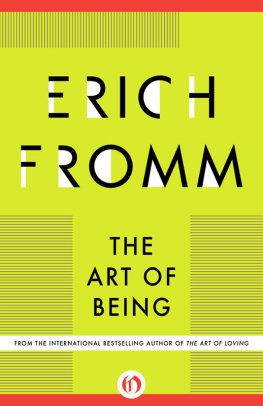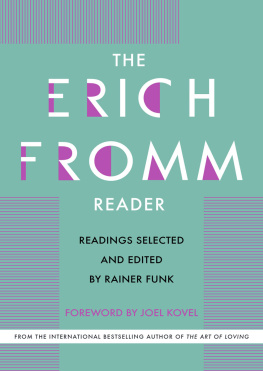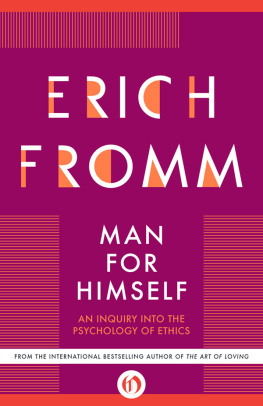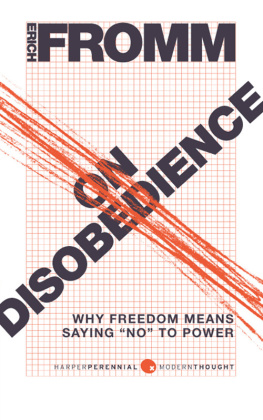Man for Himself
An Inquiry into the Psychology of Ethics
Erich Fromm

Contents
Be ye lamps unto yourselves.
Be your own reliance.
Hold to the truth within yourselves
as to the only lamp.
Buddha
True words always seem paradoxical but no other form of teaching can take its place.
Lao-Tse
Who then are the true philosophers?
Those who are lovers of the vision of truth.
Plato
My people are destroyed by the lack of knowledge;
because thou hast rejected knowledge
I will also reject thee.
Hosea
If the way which, as I have shown, leads hither seems very difficult, it can nevertheless be found. It must indeed be difficult since it is so seldom discovered; for if salvation lay ready to hand and could be discovered without great labor, how could it be possible that it should be neglected almost by everybody? But all noble things are as difficult as they are rare.
Spinoza
Foreword
This book is in many respects a continuation of Escape from Freedom, in which I attempted to analyze modern mans escape from himself and from his freedom; in this book I discuss the problem of ethics, of norms and values leading to the realization of mans self and of his potentialities. It is unavoidable that certain ideas expressed in Escape from Freedom are repeated in this book, and although I have tried as much as possible to shorten discussions which are overlapping, I could not omit them entirely. In the chapter on Human Nature and Character, I discuss topics of characterology which were not taken up in the former book and make only brief reference to the problems discussed there. The reader who wishes to have a complete picture of my characterology must read both books, although this is not necessary for the understanding of the present volume.
It may be surprising to many readers to find a psychoanalyst dealing with problems of ethics and, particularly, taking the position that psychology must not only debunk false ethical judgments but can, beyond that, be the basis for building objective and valid norms of conduct. This position is in contrast to the trend prevailing in modern psychology which emphasizes adjustment rather than goodness and is on the side of ethical relativism. My experience as a practicing psychoanalyst has confirmed my conviction that problems of ethics cannot be omitted from the study of personality, either theoretically or therapeutically. The value judgments we make determine our actions, and upon their validity rests our mental health and happiness. To consider evaluations only as so many rationalizations of unconscious, irrational desiresalthough they can be that toonarrows down and distorts our picture of the total personality. Neurosis itself is, in the last analysis, a symptom of moral failure (although adjustment is by no means a symptom of moral achievement). In many instances a neurotic symptom is the specific expression of moral conflict, and the success of the therapeutic effort depends on the understanding and solution of the persons moral problem.
The divorcement of psychology from ethics is of a comparatively recent date. The great humanistic ethical thinkers of the past, on whose works this book is based, were philosophers and psychologists; they believed that the understanding of mans nature and the understanding of values and norms for his life were interdependent. Freud and his school, on the other hand, though making an invaluable contribution to the progress of ethical thought by the debunking of irrational value judgments, took a relativistic position with regard to values, a position which had a negative effect not only upon the development of ethical theory but also upon the progress of psychology itself.
The most notable exception to this trend in psychoanalysis is C. G. Jung. He recognized that psychology and psychotherapy are bound up with the philosophical and moral problems of man. But while this recognition is exceedingly important in itself, Jungs philosophical orientation led only to a reaction against Freud and not to a philosophically oriented psychology going beyond Freud. To Jung the unconscious and the myth have become new sources of revelation, supposed to be superior to rational thought just because of their non-rational origin. It was the strength of the monotheistic religions of the West as well as of the great religions of India and China to be concerned with the truth and to claim that theirs was the true faith. While this conviction often caused fanatical intolerance against other religions, at the same time it implanted into adherents and opponents alike the respect for truth. In his eclectic admiration for any religion Jung has relinquished this search for the truth in his theory. Any system, if it is only non-rational, any myth or symbol, to him is of equal value. He is a relativist with regard to religionthe negative and not the opposite of rational relativism which he so ardently combats. This irrationalism, whether veiled in psychological, philosophical, racial, or political terms, is not progress but reaction. The failure of eighteenth- and nineteenth-century rationalism was not due to its belief in reason but to the narrowness of its concepts. Not less but more reason and an unabating search for the truth can correct errors of a one-sided rationalismnot a pseudoreligious obscurantism.
Psychology cannot be divorced from philosophy and ethic nor from sociology and economics. The fact that I have emphasized in this book the philosophical problems of psychology does not mean that I have come to believe that the socio-economic factors are less important: this one-sided emphasis is due entirely to considerations of presentation, and I hope to publish another volume on social psychology centered around the interaction of psychic and socio-economic factors.
It might seem that the psychoanalyst, who is in the position of observing the tenacity and stubbornness of irrational strivings, would take a pessimistic view with regard to mans ability to govern himself and to free himself from the bondage of irrational passions. I must confess that during my analytic work I have become increasingly impressed by the opposite phenomenon: by the strength of the strivings for happiness and health, which are part of the natural equipment of man. Curing means removing the obstacles which prevent them from becoming effective. Indeed, there is less reason to be puzzled by the fact that there are so many neurotic people than by the phenomenon that most people are relatively healthy in spite of the many adverse influences they are exposed to.
One word of warning seems to be indicated. Many people today expect that books on psychology will give them prescriptions on how to attain happiness or peace of mind. This book does not contain any such advice. It is a theoretical attempt to clarify the problem of ethics and psychology; its aim is to make the reader question himself rather than to pacify him.
I cannot adequately express my indebtedness to those friends, colleagues, and students whose stimulation and suggestions helped me in writing the present volume. However, I wish to acknowledge specifically my gratitude to those who have contributed directly to the completion of this volume. Especially Mr. Patrick Mullahys assistance has been invaluable; he and Dr. Alfred Seidemann have made a number of stimulating suggestions and criticisms in connection with the philosophical issues raised in the book. I am very much indebted to Professor David Riesman for many constructive suggestions and to Mr. Donald Slesinger who has improved the readability of the manuscript considerably. Most of all I am indebted to my wife, who helped with the revision of the manuscript and who made many significant suggestions with regard to the organization and the content of the book; particularly the concept of the positive and negative aspects of the nonproductive orientation owes much to her suggestions.

